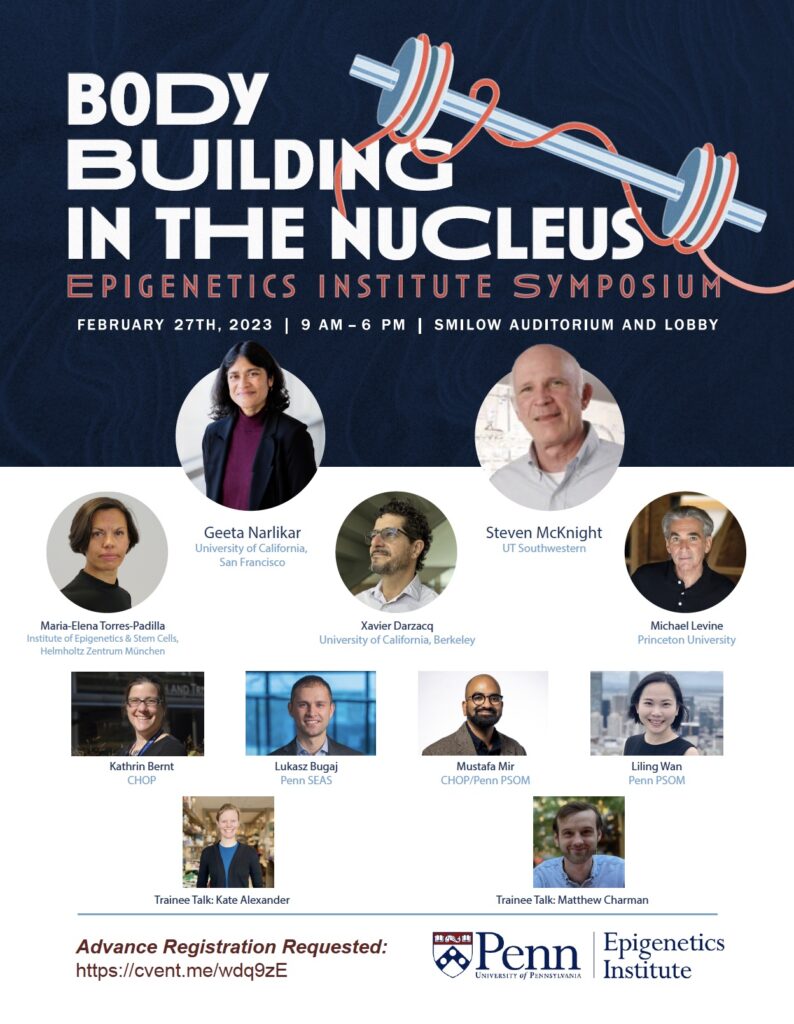February 27, 2023
Rubenstein Auditorium and Lobby
Smilow Center for Translational Research
Perelman School of Medicine, University of Pennsylvania
Register Now: https://cvent.me/wdq9zE
2023 Body Building in the Nucleus Symposium
KEYNOTE SPEAKERS
![Geeta Narlikar_photo resized[90] Geeta Narlikar Photo](https://hosting.med.upenn.edu/epigenetics-dev/wp-content/uploads/sites/84/sites/84/2022/08/Geeta-Narlikar_photo-resized90-300x300.jpg)
Geeta Narlikar, Ph.D.
Professor and Vice-Chair
Biochemistry and Biophysics
Lewis and Ruth Cozen Chair I
University of California, San Francisco
https://narlikarlab.ucsf.edu/dr-narlikar
Dr. Narlikar obtained her Ph.D. in Chemistry at Stanford University under the mentorship of Dr. Daniel Herschlag and carried out postdoctoral research at Harvard Medical School under the mentorship of Dr. Robert Kingston. She has been a faculty member in the Department of Biochemistry and Biophysics at UCSF since 2003. She is an expert in the fields of epigenetic regulation and genome organization. Dr. Narlikar studies how the folding and compartmentalization of our genome is regulated to generate the many cell types that make up our body. Her laboratory has pioneered the application of sophisticated biophysical approaches to study the mechanisms of macromolecules that regulate genome organization. Through these studies they are learning (i) how nanoscale molecular motors use chemical energy to cause mechanical disruptions in the packaged genome, (ii) that the smallest unit of genome folding, a nucleosome, acts akin to a dynamic receptor rather than a static packaging unit and, (iii) that liquid-liquid phase separation processes can help organize and sequester large regions of the genome. These types of discoveries from the Narlikar laboratory are changing textbook descriptions of genome packaging and suggesting new avenues to tackle diseases caused by defects in genome organization.
Dr. Narlikar enjoys teaching and mentoring graduate students. She believes that kindling the fire of curiosity within graduate students and consistently supporting their initiative brings out the best in them.
Dr. Narlikar’s scientific work has been recognized by different awards during the course of her faculty career. These include the Beckman Young Investigator Award (2006), the Leukemia and Lymphoma Society Scholar Award (2008), the Outstanding Faculty Mentorship Award by the UCSF Graduate Students Association (2011), the Deleage Prize awarded by the Deleage foundation (2017), the Glenn Award for Research in Biological Mechanisms of Aging (2018), and the Distinguished Alumnus Award from the Indian Institute of Technology, Mumbai (2018). Since 2017, Professor Narlikar has been appointed to the Lewis and Ruth Cozen Chair I. She was elected to the National Academy of Sciences in 2021.
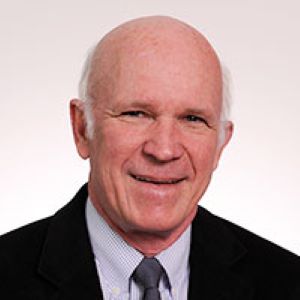
Steven McKnight, Ph.D.
Distinguished Chair in Basic Biomedical Research
Department of Biochemistry
UT Southwestern
https://profiles.utsouthwestern.edu/profile/14812/steven-mcknight.html
Steve McKnight received his bachelor’s degree in biology from the University of Texas in 1974 and his PhD degree in biology from the University of Virginia in 1977. He conducted postdoctoral research at the Carnegie Institution of Washington under the mentorship of Donald Brown and was appointed as a staff member of that institution in 1983. He was appointed as a Howard Hughes Medical Institute investigator in 1988. His research focus at the Carnegie Institution was on gene regulation. He used molecular biological methods to define the regulatory DNA sequences constituting the promoter of the herpes simplex virus thymidine kinase gene, then employed biochemical methods to purify gene specific transcription factors including members of the C/EBP and GABP families of transcription factors.
In 1991 Dr. McKnight left academia to co-found Tularik, a San Francisco-based biotechnology company devoted to the discovery of ethical drugs acting to treat disease state via the regulation of gene expression. In 1995 Dr. McKnight moved from Tularik to UT Southwestern and in 1996 he was appointed as chairman of the Department of Biochemistry. Over the past 11 years Dr. McKnight has directed an active research laboratory and has guided the Department of Biochemistry to substantial growth in the disciplines of chemistry, biochemistry and biophysics. Dr. McKnight is a member of the National Academy of Sciences, the Institute of Medicine and the American Academy of Arts and Sciences.
SCHEDULE
Click the arrow to display the schedule.
Toggle title
Rubenstein Auditorium and Lobby
Smilow Center for Translational Research
Perelman School of Medicine, University of Pennsylvania
3400 Civic Center Blvd
Philadelphia, PA 19104
Info
Introduction
Jon Epstein, MD
Shelley Berger, PhD
“Epigenetic mechanisms of cellular plasticity and reprogramming to totipotency”
Maria-Elena Torres-Padilla, PhD
“Molecular kinetics of nuclear organization and transcription during embryonic development”
Mustafa Mir, PhD
Break
“How do protein domains of low sequence complexity work?”
Keynote: Steven McKnight, PhD
“Molecular tools to control and observe protein condensates”
Lukasz Bugaj, PhD
“What can we learn by interrogating molecular interactions in their cellular context?””
Xavier Darzacq, PhD
Lunch
“Long-range connectivity of the regulatory genome”
Michael Levine, PhD
“In-speck-ting the nucleus: nuclear speckles as a critical layer of gene regulation”
Kate Alexander, PhD
“Decoding oncogenic assemblies on chromatin”
Liling Wan, PhD
Break
“IDP mediated transcriptional stabilization as a cause of AML”
Kathrin Bernt, MD
“Adenovirus: champion bodybuilder”
Matthew Charman, PhD
“ATP-dependent and independent mechanisms for regulating chromatin”
Keynote: Geeta Narlikar, PhD
Panel Discussion
Reception
ADDITIONAL SPEAKERS
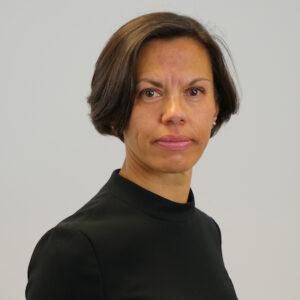
Maria-Elena Torres-Padilla, Ph.D.
Director, Institute of Epigenetics and Stem Cells, Helmholtz Zentrum München
Maria-Elena studied Biology at the Faculty of Sciences of the UNAM, Mexico and obtained her Ph.D at the Institut Pasteur in Paris. She was a postdoctoral fellow at The Gurdon Institute, University of Cambridge and started her own lab in Strasbourg in 2009. She moved to Munich in 2016, where she is the Director of the Institute of Epigenetics & Stem Cells at Helmholtz Munich and is Professor of Stem Cell Biology at the LMU University. Maria-Elena’s research has been devoted to unravelling the epigenetic mechanisms behind cellular plasticity and cell fate. Her team combines high-resolution microscopy, single-cell and low-input genomic approaches with functional perturbations to study the epigenetic principles underlying cellular reprogramming and the establishment of totipotency in the early mouse embryo.
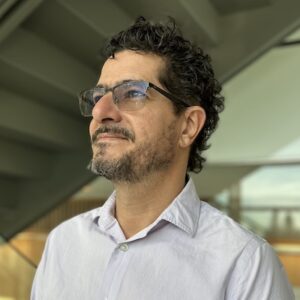
Xavier Darzacq, Ph.D.
Department of Molecular and Cell Biology
Xavier Darzacq develops advanced imaging techniques to visualize and quantify single-molecule dynamics in live cells. His ultimate goal is to decipher the rules governing transcription regulation within a living cell. Professor Darzacq obtained his Ph.D with Dr. Tamas Kiss at the University of Toulouse were he discovered the first function of Cajal bodies. In 2002 Xavier joined the Laboratory of Dr. Robert Singer, Albert Einstein College of Medicine (New York) to be trained in light microscopy techniques for single molecule imaging in live cells. During his post-doctoral studies, he developed imaging technologies using genetically encoded fluorescent tags to follow transcription. These biosensors of genetic expression are used to dissect the kinetics of RNA polymerase II within its natural nuclear environment. In 2008-2009, Xavier started his own lab at IBENS to study how chromatin structure and nuclear architecture regulate transcription developing strong partnerships with industry focusing on the implementation of new technologies to the field of imaging single molecules. His recent findings suggest a very strong link between the organization of the nucleoplasm and the biophysical rules governing transcription factor assemblies. In 2014, Professor Darzacq moved his lab to UC Berkeley to continue his work on transcription regulation and 3D genome organization focusing on the biophysical rules governing gene expression control in differentiating cells using ES cells and self-regenerating human tissues. Recently the Darzacq lab in strong partnership with the lab of Robert Tjian has been tackling fundamental questions on the 3D distribution of chromatin and the proteins regulating it. In 2019 Darzacq co-founded Eikon therapeutics, a pharmaceutical company developing new drugs using live cell imaging single molecule approaches.
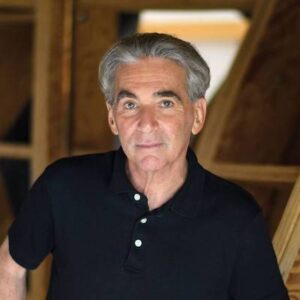
Michael Levine, Ph.D.
Anthony B. Evnin ’62 Professor in Genomics
Professor of Molecular Biology and the Lewis-Sigler Institute for Integrative Genomics
Director, Lewis-Sigler Institute for Integrative Genomics
Princeton University, Department of Molecular Biology
My lab studies developmental enhancers, which produce precise on/off patterns of gene expression during embryogenesis. For many years we have used the early Drosophila embryo to explore properties of developmental enhancers, including their ability to co-regulate distant genes located in cis on the same chromosome or in trans on different homologs (transvection). Our more recent studies focus on tethering elements, which facilitate long-range enhancer-promoter and promoter-promoter interactions. Targeted deletions of tethering elements cause delays and uncoupling of gene expression. We propose that genome organizing elements, boundaries and tethers, limit the sphere of enhancer activity to ensure frequent interactions with their target promoters (“firefly in a jar”). I will also discuss evidence for “meta-loops” that bring together ultra-distant (2-20 Mb) neurogenic genes in the Drosophila brain.

Liling Wan, Ph.D.
Assistant Investigator, Abramson Family Cancer Research Institute
Dr. Wan is currently an Assistant Professor of Cancer Biology at University of Pennsylvania. She received a B.S. in Biological Sciences and Biotechnology from Tsinghua University, and a Ph.D. in Molecular Biology from Princeton University. She carried out postdoctoral studies with David Allis at Rockefeller University, where she made seminal discoveries on how chromatin ‘reader’ proteins interpret the epigenetic information to impact gene expression in cancer. The Wan laboratory seeks to better understand chromatin regulatory mechanisms underlying gene control, how these mechanisms are dysregulated in cancer, and how we can harness these insights for therapeutics. Dr. Wan has been recognized for her research through numerous awards including a K99/R00 NIH Pathway to Independence Award, AACR NextGen Star, NIH Director’s New Innovator Award, and she was recently named a Pew-Stewart Scholar, a V Foundation Scholar, and an American Society of Hematology Scholar.

Mustafa Mir, Ph.D.
Assistant Professor of Cell and Developmental Biology
The Children’s Hospital of Philadelphia, University of Pennsylvania
Department of Cell and Developmental Biology
Dr. Mustafa Mir is an electrical engineer turned biophysicist /developmental biologist who is focused on understanding the molecular underpinnings of transcription regulation and nuclear organization in the context of early embryonic development. Dr. Mir received his PhD in Electrical Engineering in 2013 from the University of Illinois at Urbana-Champaign. During his graduate work he invented new microscopes that provide high resolution quantitative phase images of living cells without using any exogenous labels. He applied these new microscopes to a variety of applications ranging from clinical analysis of blood samples, to single cell growth, and neural development. For his postdoctoral work at the University of California, Berkeley, Dr. Mir studied gene regulation in Drosophila embryos and built a customized lattice-Light Sheet microscope to capture the first data on transcription factor dynamics within the nuclei of a living animal embryo. Dr. Mir started his independent lab at UPenn and CHOP in January 2021. His lab focuses on utilizing and developing advanced fluorescence microscopy methods alongside optogenetics, genomics, and gene editing, to study gene regulation and nuclear organization during early embryonic development and in disease. Dr. Mir is a member of the Cell and Developmental Biology Department, Center for Computational and Genomic Medicine, the Epigenetics Institute, and the Institute for Regenerative Medicine, he received the NIH Directors New Innovator Award in 2021.
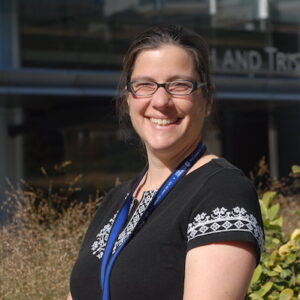
Kathrin Bernt, M.D.
The Children’s Hospital of Philadelphia
Assistant Professor of Pediatrics
University of Pennsylvania
As a physician scientist, my goal is to further our understanding of the role of epigenetic modifiers in hematopoietic stem cell biology and leukemia, and translate findings into novel therapies. There is a growing appreciation that epigenetic changes play a role in a wide variety of cancers and may govern biological processes associated with relapse and refractory disease. I am using a combination of genetic conditional loss of function models for epigenetic modifiers, murine leukemia models, primary patient material, genome wide expression and epigenetic profiling, and small molecule inhibitors to dissect epigenetic mechanisms controlling stemness, self-renewal and development in normal hematopoiesis and hematopoietic malignancies. My goal is to develop the depth of mechanistic understanding that will allow targeted pharmacologic modulation of epigenetic and transcriptional states as a means to develop more specific therapies for cancer.

Lukasz Bugaj, PhD
Lukasz Bugaj is an assistant professor in Bioengineering at Penn. His lab studies how cells perceive cell signals, and how signal perception goes awry in diseases like cancer. The Bugaj Lab specializes in light-activated —”optogenetic”—approaches, whereby intracelluar biochemistry can be controlled in a precise manner using light as a stimulus. As a graduate student, Lukasz developed optogenetic protein clustering which has been applied across many contexts, including in the study of protein phase separation. The Bugaj Lab continues to develop molecular probes, including 1) new classes of optogenetic proteins that cluster under light stimulation; 2) probes that can be controlled with temperature as an alternative stimulus, and 3) fluorescent reporters of submicroscopic protein clusters that are otherwise difficult to observe. The lab then uses these tools to study how signaling information is transmitted through cells and how disease states functionally alter signal flow, with a focus on the role of oncogenic protein condensates in cancer and drug resistance signaling.
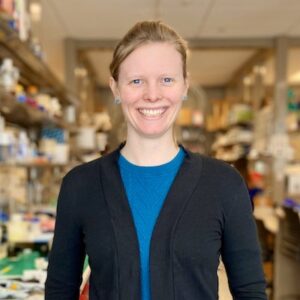
Trainee Talk: Kate Alexander, Ph.D.
Kate Alexander, PhD, is a postdoctoral fellow in Dr. Shelley Berger’s Laboratory within the Epigenetics Institute and Department of Cell & Developmental Biology at the University of Pennsylvania. Dr. Alexander earned her Bachelor of Arts from Carleton College in Biology and Biochemistry, and her PhD from Cornell University in the Field of Pharmacology. At Carleton College, she earned Distinction in Integrative Exercise and Major, was awarded the Pat Lamb Award for Academic and Athletic Excellence, and in 2020 was inducted into the Athletics Hall of Fame. In support of her research, Dr. Alexander has been awarded an NIH institutional training grant, an NIH NRSA F32 Fellowship, and the Marlene Shlomchik Fellowship in Cancer Research. She has also been awarded travel awards and talks at Keystone and Cold Spring Harbor international conferences. Dr. Alexander’s research has spanned embryonic development, immune cell functions, and cancer, with the central goal of understanding how genes are regulated in healthy organisms and disease states. Her current work focuses on nuclear speckles, a fascinating substructure in the cell nucleus which Dr. Alexander has recently found to be critical regulators of gene expression and predictors of patient outcomes in cancer.
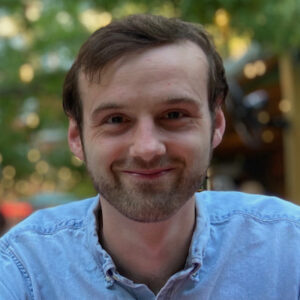
Trainee Talk: Matthew Charman, Ph.D.
Matthew Charman, PhD, is a research associate in the Weitzman laboratory at the Children’s Hospital of Philadelphia and Perelman School of Medicine. Dr Charman obtained his bachelor’s degree in Cellular and Molecular Medicine from the University of Bristol. He earned his master’s degree and PhD at the University of Glasgow-MRC Center for Virus Research, where he investigated intrinsic barriers to virus infection. During his time in the Weitzman lab, Dr Charman has earned numerous awards and accolades including a Children’s Hospital of Philadelphia Emerging Innovator Award, Cell and Gene Therapy Clinical Training, and Sprout funding from the Children’s Hospital of Philadelphia Office of Entrepreneurship and Innovation. His research interests include the spatial and temporal organization of virus infection, and how viruses harness self-assembly of intrinsically disordered proteins to generate infectious progeny. Dr Charman’s research mission aims to learn from viruses and apply these powerful lessons to develop novel therapeutic strategies and new technologies for use in gene delivery and nanomedicine.
SYMPOSIUM FLYER
